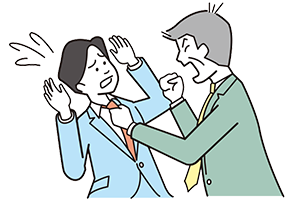What Is Harassment Related to Pregnancy, Childbirth, Childcare Leave, etc. in the Workplace?
Article 11-3 of the Equal Employment Opportunity Act and Article 25 of the Child Care and Family Care Leave Act require employers to take preventive measures against harassment related to pregnancy, childbirth, childcare leave, etc. in the workplace.
The recent amendment to the law prohibits disadvantageous treatment on the grounds that a worker has sought consultation regarding such harassment.
Article 11-3 Employers shall establish necessary systems for responding to and appropriately handling consultation from female workers and othernecessary employment measuresto ensure thatthe working environment of the female workers they employ is not harmed by language or behavior in the workplace due to the fact that they have become pregnant or given birth, or for reasons related to pregnancy or childbirth specified by Ordinance of the Ministry of Health, Labour and Welfare.
(ii) The provisions of Article 11, paragraph 2 (see II-1) apply mutatis mutandis to cases in which a worker has sought consultation as set forth in the preceding paragraph or has stated facts when cooperating with the employer’s response to said consultation.
<Equal Employment Opportunity Act (excerpt)>
Article 25 Employers must,with regard to conduct at the workplace toward an employed worker concerning the use of childcare leave, caregiver leave, or other systems or measures prescribed by Order of the Ministry of Health, Labour and Welfare on raising a child or taking care of a family member,provide counseling services to the worker, improve the system necessary for appropriately handling the matters,and take necessary employment management measures so that the employee does not suffer any disadvantage in his or her working conditions.
2 Employersshall not dismiss or otherwise treat a worker disadvantageously on the grounds that the worker has engaged in consultation as set forth in the preceding paragraph or has stated facts when cooperating with the response to said consultation.
<Child Care and Family Care Leave Act (excerpt)>
Harassment related to pregnancy, childbirth, childcare leave, etc. in the workplace refers to a situation in which the working environment offemale workerswho have become pregnant or given birth, ormale or female workerswho have applied for or taken childcare leave, etc., is harmed by the language or behavior (language or behavior related to pregnancy, childbirth, use of childcare leave, etc.) from managers or colleagues in theworkplace.
Acts are considered harassment if there is a causal relationship between pregnancy, use of childcare leave systems, etc. and the harassing behavior.
Language or behavior that can be objectively judged to be based on business necessity
from the perspective of work assignment, safety considerations, etc.is not considered harassment.
*“Systems, etc.” refers to systems or measures related to pregnancy or childbirth, such as maternity leave, as well as systems or measures such as childcare leave and caregiving leave.
Determination of “Business Necessity”
A subordinate taking a leave of absence requires the manager to make adjustments to work.
In situations where the leave of absence must be taken immediately in consideration of the worker’s physical condition, such as when ordered by a physician, etc., a manager preventing the pregnant worker from taking a leave of absence for reasons such as “we can’t operate properly if you're absent” is considered harassment.
Confirming the worker’s intentionin order to adjust the timing of leave of absences that are flexible to some extent (e.g., the date and time of a regular pregnancy checkup) is not prohibited as harassment. However, please note that unilateral notification by a manager without considering the worker’s intentions may be considered harassment.
Key points regarding measures that employers are required to implement under guidelines.
The measures thatemployersshould take to prevent harassment related to pregnancy, childbirth, childcare leave, etc. in the workplaceare as follows.
*Employers must implement these measures without fail.







